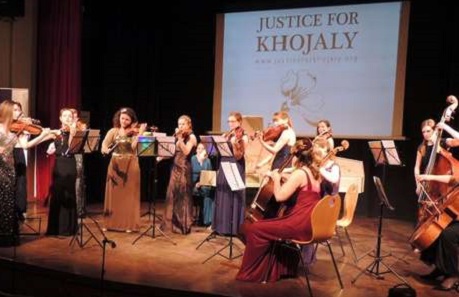The massacre claimed the lives of 613 civilian victims in 1992, including 106 women, 63 children and 70 elderly people.
Over 250 diplomats, business leaders, music aficionados living in Paris and members of the Azerbaijani diaspora attended the concert held on February 23.
Dignitaries present included Mrs Nigar Huseynova, First Secretary, Azerbaijani Embassy to France and Pierre Thilloy, whose work Lamento – In Memoriam was premiered that evening, having been written in memory of the victims.
In June 1944, towards the end of World War II, the occupying Nazi forces destroyed the French town of Oradour-sur-Glane and 642 innocent townspeople were brutally executed. The devastated town has been left in its current state for over 70 years so the world does not forget the brutality of war on ordinary lives. Making a direct parallel with Khojaly – whose death toll was similar – Philippe Lacroix, Mayor of Oradour and Benoit Sadry, Representative, National Association for the Families of Martyrs, also attended the concert as a mark of solidarity.
The ongoing volatility of the conflict was emphasized by vandalism of the walls and pavements around the theatre by an isolated group of Armenian extremists with insulting comments concerning Azerbaijan.
Marie-Laetitia Gordin, Director, The European Azerbaijan Society (TEAS) explained: “TEAS is organizing a series of events within the framework of the Justice for Khojaly campaign, initiated in 2008 by Leyla Aliyeva, Vice President of the Heydar Aliyev Foundation, and now active in more than 100 countries.
This calls for the restoration of justice and peace in the region. This year, TEAS is presenting Khojaly commemorations in London, Strasbourg, Brussels, Bern, Dublin, Istanbul, Ankara, Rome, Vilnius and Luxembourg – in addition to tonight’s event in Paris. Usually, when Azerbaijan is discussed in France, this focuses on its geographic situation and history. Often there is a lack of information, and that which is available is biased and misleading.”
The organization of a concert of this kind is most appropriate, as it pays homage to the cultural legacy of the Azerbaijani occupied regions. The town of Shusha, for example, was the birthplace of many great Azerbaijani musicians, including Uzeyir Hajibeyli, father of Azerbaijani classical music.
The evening featured three outstanding Azerbaijani musicians – Arslan Novrasli, player of the tar, an Azerbaijani national instrument, developed in Nagorno-Karabakh; Sabina Rakcheyeva (violin); and Nazrin Rashidova (violin), who led her all-female FeMusa Orchestra.
In addition to the new work Lamento – In memoriam, performed by Sabina and Nazrin and incorporating the plaintive sound of the mugham singer, the programme comprised a mixture of Azerbaijani and European music. The selection was drawn from some of the most renowned Azerbaijani composers, including Gara Garayev’s Funeral Ode and two works featuring the evocative tar of Arslan Novrasli – Vasif Adigezalov’s Carnation and Azer Rzayev’s Meditation. These were performed alongside uplifting and reflective works by Antonio Vivaldi, Paul Lewis, Karl Jenkins and Gabriel Fauré.
More about:
















































